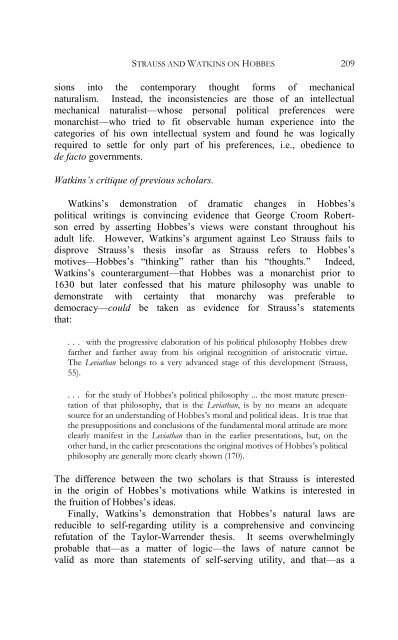Strauss and Watkins on Hobbes' Political Philosophy: A Review
Strauss and Watkins on Hobbes' Political Philosophy: A Review
Strauss and Watkins on Hobbes' Political Philosophy: A Review
You also want an ePaper? Increase the reach of your titles
YUMPU automatically turns print PDFs into web optimized ePapers that Google loves.
STRAUSS AND WATKINS ON HOBBES 209<br />
si<strong>on</strong>s into the c<strong>on</strong>temporary thought forms of mechanical<br />
naturalism. Instead, the inc<strong>on</strong>sistencies are those of an intellectual<br />
mechanical naturalist—whose pers<strong>on</strong>al political preferences were<br />
m<strong>on</strong>archist—who tried to fit observable human experience into the<br />
categories of his own intellectual system <str<strong>on</strong>g>and</str<strong>on</strong>g> found he was logically<br />
required to settle for <strong>on</strong>ly part of his preferences, i.e., obedience to<br />
de facto governments.<br />
<str<strong>on</strong>g>Watkins</str<strong>on</strong>g>’s critique of previous scholars.<br />
<str<strong>on</strong>g>Watkins</str<strong>on</strong>g>’s dem<strong>on</strong>strati<strong>on</strong> of dramatic changes in Hobbes’s<br />
political writings is c<strong>on</strong>vincing evidence that George Croom Robert-<br />
s<strong>on</strong> erred by asserting Hobbes’s views were c<strong>on</strong>stant throughout his<br />
adult life. However, <str<strong>on</strong>g>Watkins</str<strong>on</strong>g>’s argument against Leo <str<strong>on</strong>g>Strauss</str<strong>on</strong>g> fails to<br />
disprove <str<strong>on</strong>g>Strauss</str<strong>on</strong>g>’s thesis insofar as <str<strong>on</strong>g>Strauss</str<strong>on</strong>g> refers to Hobbes’s<br />
motives—Hobbes’s “thinking” rather than his “thoughts.” Indeed,<br />
<str<strong>on</strong>g>Watkins</str<strong>on</strong>g>’s counterargument—that Hobbes was a m<strong>on</strong>archist prior to<br />
1630 but later c<strong>on</strong>fessed that his mature philosophy was unable to<br />
dem<strong>on</strong>strate with certainty that m<strong>on</strong>archy was preferable to<br />
democracy—could be taken as evidence for <str<strong>on</strong>g>Strauss</str<strong>on</strong>g>’s statements<br />
that:<br />
. . . with the progressive elaborati<strong>on</strong> of his political philosophy Hobbes drew<br />
farther <str<strong>on</strong>g>and</str<strong>on</strong>g> farther away from his original recogniti<strong>on</strong> of aristocratic virtue.<br />
The Leviathan bel<strong>on</strong>gs to a very advanced stage of this development (<str<strong>on</strong>g>Strauss</str<strong>on</strong>g>,<br />
55).<br />
. . . for the study of Hobbes’s political philosophy ... the most mature presen-<br />
tati<strong>on</strong> of that philosophy, that is the Leviathan, is by no means an adequate<br />
source for an underst<str<strong>on</strong>g>and</str<strong>on</strong>g>ing of Hobbes’s moral <str<strong>on</strong>g>and</str<strong>on</strong>g> political ideas. It is true that<br />
the presuppositi<strong>on</strong>s <str<strong>on</strong>g>and</str<strong>on</strong>g> c<strong>on</strong>clusi<strong>on</strong>s of the fundamental moral attitude are more<br />
clearly manifest in the Leviathan than in the earlier presentati<strong>on</strong>s, but, <strong>on</strong> the<br />
other h<str<strong>on</strong>g>and</str<strong>on</strong>g>, in the earlier presentati<strong>on</strong>s the original motives of Hobbes’s political<br />
philosophy are generally more clearly shown (170).<br />
The difference between the two scholars is that <str<strong>on</strong>g>Strauss</str<strong>on</strong>g> is interested<br />
in the origin of Hobbes’s motivati<strong>on</strong>s while <str<strong>on</strong>g>Watkins</str<strong>on</strong>g> is interested in<br />
the fruiti<strong>on</strong> of Hobbes’s ideas.<br />
Finally, <str<strong>on</strong>g>Watkins</str<strong>on</strong>g>’s dem<strong>on</strong>strati<strong>on</strong> that Hobbes’s natural laws are<br />
reducible to self-regarding utility is a comprehensive <str<strong>on</strong>g>and</str<strong>on</strong>g> c<strong>on</strong>vincing<br />
refutati<strong>on</strong> of the Taylor-Warrender thesis. It seems overwhelmingly<br />
probable that—as a matter of logic—the laws of nature cannot be<br />
valid as more than statements of self-serving utility, <str<strong>on</strong>g>and</str<strong>on</strong>g> that—as a
















